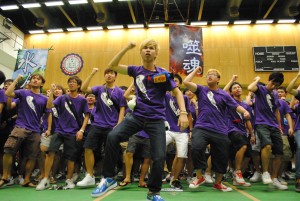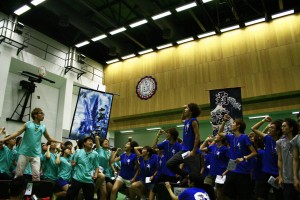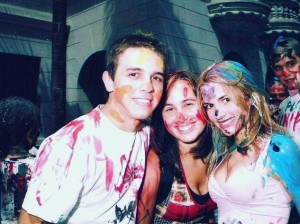What orientation programmes tell us about different cultures
Reporters: Sandy Ho and Gavin Li
You might have come across groups of young people wearing identical T-shirts hurrying down busy streets in bustling city centres before. You may even have seen them mimicking the people on the treadmills in a fitness centre across the street on a busy footbridge in Wan Chai, or shouting “wow” in Causeway Bay’s Times Square for no apparent reason at all.
These fresh-faced youngsters are in fact university freshmen striving to complete various tasks and beat their fellows in a game called “city hunt”, a highlight of university orientation camps, commonly known as “o’camp”, in Hong Kong.
“I think it’s really fun to go around Hong Kong with a group of new friends. Some groupmates know a place better and the others are more familiar with somewhere else. [By] cooperating closely with each other, I feel a sense of achievement [when I see we can finish the task],” says Jessie Kwok Ji-ying, a participant of the orientation camp at Hong Kong Baptist University.
Apart from gaining great satisfaction during the game, Kwok thinks the “city hunt” also helps to develop solidarity and a sense of belonging to the group.

Not everyone is pleased with their presence though. “It’s as if I have entered a wet market with people shouting at you to buy fish and vegetables from them. Do they have to do it on the street?” asks passer-by Yeung Suk-ching in Central.
Dr. Edwin Chan Ho-yin, Chairperson of the Joint Committee on New Student Orientation at the Chinese University of Hong Kong (CUHK) thinks students may be so caught up in the moment, they are not aware of other people’s reactions, “Many are happy about being able to get into university, so they might think the world revolves around them and they can just shout slogans on the street and then run away,’’ he says.
While freshmen in Hong Kong build team spirit by playing games that emulate reality TV, their counterparts elsewhere in the world achieve the same goal in their own distinctive ways.
“We have this race on the river. Every major builds their own boat. Two people are gonna sit on the boat with paddles and the whole school is gonna be there, and you wear the T-shirt from your subject,” Swedish student Stina Alpsten says.
“It doesn’t necessarily have to be a boat. It could be anything that could float on water,” her friend Joanna Bergkvist, who is also from Sweden, adds.
In South Korea, freshmen express their excitement in a less public way. Michael Kim Young-woo, a student at Sung Kyun Kwan University in South Korea recalls an activity called “Room Attack” during their orientation camp.
“Every group has their own room. In the night, we have to attack the other room. We grab some Soju, a type of Korean alcohol, and the group captain would sing some songs and introduce himself, and we will have a drinking game with that group all night.”
Kim notes that the drinking games can serve the same function of fostering unity among the students as a “city hunt” does in Hong Kong.
He says there is no reason to play games off campus, as they would not find it fun to do things in front of the public. “I think Korean students don’t like such things. If we do the games outside the campus, other people are gonna see us. If we do that, like showing off my university student status, I think Korean people don’t like it. We have to act humble.”
“City hunt” may well be the climax for Hong Kong students during the orientation week, but what freshmen remember most afterwards is probably the cheer slogans that their seniors teach them.
University students in Hong Kong usually call this group activity “dem cheers” or “dem beat”. Participants shout rhyming slogans to talk themselves up or berate others. This is usually accompanied by a set of gestures such as clapping their hands or thumping their feet on the floor. The purpose is to give freshmen their group identity and sense of attachment. It is so popular on university campuses that it has virtually become a tradition over the last decade.

“You can say that ‘dem beat’ is like a battle cry from the past, with drums playing and military marches to boost the troops’ morale,” says CUHK student Alan Leung Wai-kit. “But I don’t think there is any significant meaning behind it. . . Actually it reminds me more of what primitives used to do.”
Carmen Ng Kar-men from the University of Waterloo in Canada says freshmen have to come up with their own slogans instead of learning it from their seniors and there is no hand clapping and foot thumping or at least much less than that seen in Hong Kong.
Meanwhile, Professor Saskia Witteborn at the CUHK finds it striking that students do so many things in groups on campus, including the collective singing and clapping.
“Those were things that were new to me because the little bit of orientation that I’d seen in American campuses was quieter. There was definitely no singing and clapping and games going on campus, but here [in Hong Kong] it seems to me it is very important to engage people to become comfortable with each other,” says Witteborn.
Another highlight of the orientation week apart from “city hunt” is “Wu Pin” (literally meaning mutual slashing in Cantonese) or exchanging insults, which is more prominent at CUHK. It is an occasion during which opposing groups, usually from the different colleges, take turns at shouting slogans to insult and taunt their opponents.

There have been controversies over the obscenity and vulgarity of the slogans during “Wu Pin” in the past.
The verbal battle is a way for students to heighten team spirit over a short time by establishing enemies.
Having said that, there is also a harmonious side to local “o’camp”.
In Hong Kong, as elsewhere, freshmen are usually divided into groups, each headed by seniors who act as leaders. What makes the local o’camp unique is that the newbies are told to address their seniors as Jo ba and Jo ma (meaning “group dad” and “group mum”).
CUHK student Alan Leung Wai-kit feels comfortable calling his group leaders by these names. “Compared with ‘group leader’, I think ‘group dad’ sounds friendlier. ‘Group leader’ itself feels more administrative while “Jo ba” really gives you a sense of family.”
Leung adds that these Jo ba and Jo ma take care of the freshmen as if they were really their sons and daughters, citing instances of them helping their exhausted “children” to carry their belongings.
Professor Joseph Bosco from the Department of Anthropology at the CUHK finds the borrowing of the motherhood idea in the student domain “very interesting”.
“They [the senior students] are like a mother, in a sense. They have to take care of the child who has to be taught how to behave in this new environment, like bringing a child into the world, the university world,” says Bosco.
He also attributes it to traditional Chinese hierarchies. “Across the Chinese, you don’t say just tongxue (classmate). You usually say xuemei (school sister), xuezhang (school brother). You always have a clear sense of hierarchy.”
A similar orientation camp tradition can also be found in Korea, says Korean student Michael Kim. There, senior students voluntarily fork out cash to buy milk for the freshmen in their group for one month. Kim explains they are willing to do so because they were treated with the same hospitality when they were freshmen.
Meanwhile, a variant of the senior-junior relationship can also be found in Brazil, only instead of a familial tie it is based on a “master-servant” relationship.
University of Sao Paulo student Douglas Trindade describes an initiation rite called “pedágio” popular in Brazil. First, freshmen paint their bodies in different colours and boys get the weirdest haircut imaginable. The new students are then taken as “slaves”, purely for amusement, by their seniors and are asked to beg for money on the roadside from the people in cars that have stopped at the traffic lights. Afterwards, they have to give all the money to their “proprietor-senior”. Half of the money goes to either charity or for a party.
“I am pretty sure this slavery joke has nothing to do with our colonial past. It’s just funny to consider someone your master for a day, you know?” says Trindade.

While university orientation programmes everywhere are mainly about having fun and making new friends, there are obvious cultural differences in achieving the same goal.
“The Norwegian students are known to have mainly, and often only, activities involving alcohol,” says Victoria Steinland from the University of Oslo. “Some say the drinking culture among Norwegian students is a little out there.”
Steinland adds that there is a festival with free events such as popular lectures, outdoor cinema and even beer brewing classes every day during what they call the “buddy weeks”, which last for two weeks.
Whereas in Germany, the “o’week” puts more focus on practicalities. “There’re orientation lectures of all kinds, even how student representation works!” says Janwillem Van De Loo who studies at the University of Hamburg.
Van De Loo thinks orientation week is something that belongs more to the Anglophone countries. “I remember Rayner, a friend from Sydney, telling me very extreme things like they get dropped off in small groups in the desert after getting hijacked really drunk from a freshers’ party,” he recalls.
In contrast, there are in general more ice-breaking games during o’camp in Hong Kong.
“In Hong Kong, it’s not as culturally easy for strangers to meet each other, so you have to provide not only more opportunities, but you have to actually do more to break the ice,” says anthropologist Joseph Bosco.
He adds that all ice-breaking games are intended to help people get to know each other more quickly. Drawing on experience from his education in the US, he thinks American students may find the games played during the orientation camp in Hong Kong very childish and not want to join in. He says: “They consider themselves adult already.”











































Interesting! And well written!